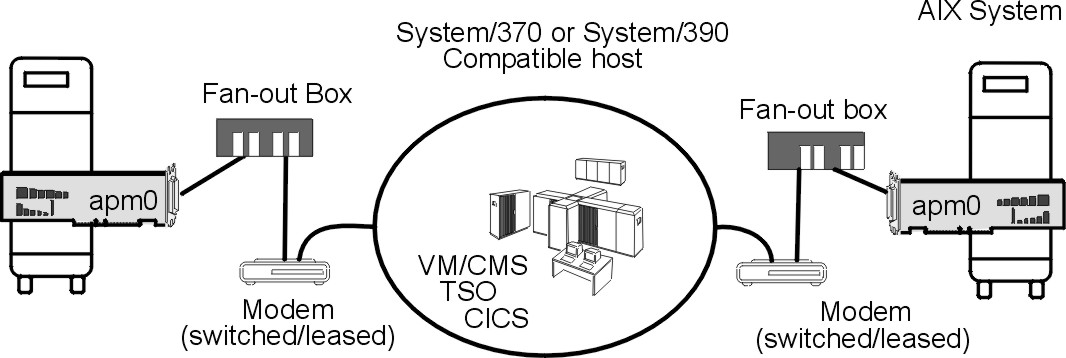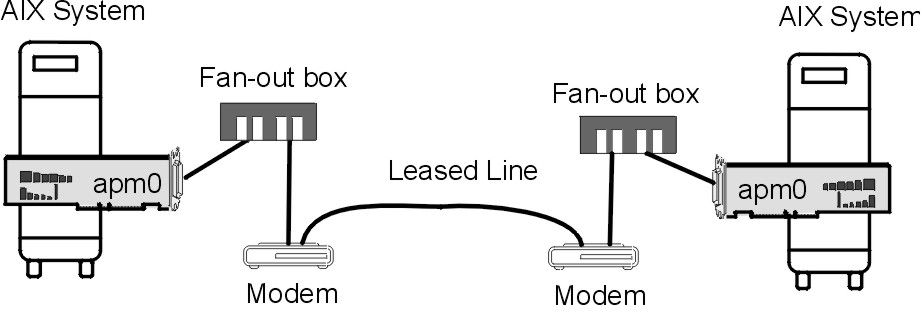
This section explains the installation and configuration requirements for the Multiport Model 2 adapter (ISA), the 2-Port Multiprotocol adapter (PCI), and the ARTIC960HX PCI adapter.
The Multiport Model 2 Adapter (MM2) device driver is a component of the communication I/O subsystem. This device driver provides support for the Multiport Model 2 at a maximum speed of 64K bps. The modems used must provide the clocking, since only external clocking is supported.
The following options provide access to the Multiport Model 2 device driver:
These options require use of the mpqi special file, which allows access to the Multiport Model 2 adapter through the Multiport Model 2 device driver. The mpqi special file resides in the /dev directory.
Note: The i in mpqi specifies the instance of the device driver; for example, mpq0.
The Multiport Model 2 device driver allows connectivity to remote host systems using the Multiport Model 2 adapter, either directly over a leased line or over switched circuits, as shown in the "Host Connectivity over Switched Circuits" figure. The device driver can provide a gateway between work group environments and remote data processing facilities.
Figure 6-1. Host Connectivity Over Switched Circuits. This illustration depicts a system connected toa host via switched modems.
 |
Direct connectivity to a system using the Multiport Model 2 adapter is also possible over a wide area network using switched modems (see "Switched Connectivity Using Switched Modems" figure), through a modem eliminator (see "Dedicated Connectivity Using Modem Eliminator" figure), or over leased lines (see "Leased Connectivity Using Leased Line" figure).
Figure 6-2. Switched Connectivity Using Switched Modems. This illustration depicts a system connected to a wide area network via switched modems.
 |
Figure 6-3. Dedicated Connectivity Using a Modem Eliminator. This illustration depicts a dedicated connection using a modem eliminator.
 |
Figure 6-4. Leased Connectivity Using a Leased Line. This illustration depicts a direct connection using a leased line between two modems.
 |
The following procedures explain
how to configure a Multiport Model 2 adapter.
| Configuring the Multiport Model 2 Adapter Tasks | |||
|---|---|---|---|
| Task | SMIT Fast Path | Command or File | Web-based System Manager Management Environment3 |
| Add a Multiport Model 2 Adapter1 | smit makmm2 | mkdev2 |
|
| List All Multiport Model 2 Adapters | smit lsmm2 | lsdev2 |
|
| Change/Show a Multiport Model 2 Adapter | smit chgmm2 | chdev2 |
|
| Configure a Defined Multiport Model 2 Adapter | smit cfgmm2 | mkdev2 |
|
| Manage Device Drivers for Multiport Model 2 Adapters | smit mm2isa_dd |
|
|
| Generate an Error Report | smit errpt |
|
|
| Trace a Multiport Model 2 Adapter | smit mm2trace |
|
|
| Remove a Multiport Model 2 Adapter | smit rmvmm2 | rmdev2 |
|
| Manage DLC Services | smit mpaserv |
|
|
| Add User-Written Applications | smit mm2apps |
|
|
Notes:
- For information on adding ports, see "Configuring Multiport/2 and Portmaster Adapters".
- Details about command line options are provided in the command descriptions for mkdev, lsdev, chdev, or rmdev in AIX 5L Version 5.1 Commands Reference.
- These tasks are not available in Web-based System Manager Management Environment.
The following sections provide information on Multiport Model 2 adapter object classes and attributes.
The Predefined Devices
(PdDv) object class contains entries for all known device types
supported by the system. This information is modified only when a new
device is added. The following tables contain information for the
Multiport Model 2 adapter.
| Device type: | portmaster |
| Device class: | adapter |
| Device subclass: | isa |
| Unique Type: | /adapter/isa/portmaster |
| Prefix name: | apm |
| Flag | Setting |
| Base Device | no |
| Vital Product Data (VPD) | no |
| Detectable | yes |
| Change Status | set to NEW when defining device |
| Bus Extender | no |
| Field Replaceable Unit (FRU) | yes |
The Predefined Connection
(PdCn) object class contains connection and dependency information for
devices. The following table contains predefined connection information
for the Multiport Model 2 adapter.
| Connection Location: | 0 |
| Unique Type: | /adapter/isa/portmaster |
| Connection Key: | portmaster |
The Predefined Attribute
(PdAt) object class contains an entry for each existing attribute for a
device, beyond what is defined in the Predefined Device object
class. The PdAt information for the Multiport Model 2
adapter includes the following definitions:
| Attribute | Description | Possible Values |
| bus_intr_lvl | ISA Interrupt Level | 3,4,7,9,10,11,12 |
| bus_io_addr | Bus IO Address | 0x2A0-0x3EA0, skip by 0x400 |
| bus_mem_addr | Bus Memory Address | 0xC0000-0xDE0000, skip by 0x200 |
| window_size | Window Size | 0x2000 (nonchangeable) |
| intr_priority | Interrupt Priority | 2 (nonchangeable) |
Note: Currently, only the 4-Port Selectable Multiport Model 2 Adapter is supported.
The device driver for the Multiport Model 2 adapter provides for Power Management (PM) support. PM is a technique that enables hardware and software to minimize system power consumption. PM is generally only important to low-end models, such as Notebooks and systems operating on battery.
When Power Management is enabled, the system enters a power-saving mode under one of the following conditions:
PM state transitions include the following:
Each transition implies a further decrease in the power supply to the various system components.
Refer to "Using Power Management" in AIX 5L Version 5.1 System Management Guide: Operating System and Devices for detailed information on Power Management and its configuration and function.
Bringing a system to the suspend, hibernation, or shutdown states results in loss of power to the adapters. All network connections are lost. Externally, this can be viewed as pulling the physical connection (cable), since it results in loss of signal at the physical layer. A data set ready (DSR) error is generated. Any application that has the device driver opened should be stopped before suspending, hibernating, or shutting down the system.
Once power is restored, all previously configured ports are restored to an available state. At that time, any applications previously using these connections can be restarted.
The 2-Port Multiprotocol Adapter high-level data link control (HDLC) device driver is a component of the communication I/O subsystem. This device driver provides support for the HDLC operation over the 2-Port Multiprotocol adapter at speeds up to 64K bps.
The following options provide access to the 2-Port Multiprotocol HDLC Network device driver:
Note: The above options require use of the mpqn special file, which allows access to the 2-Port Multiprotocol adapter's HDLC device driver through the SDLC COMIO device driver emulation subsystem. This subsystem must be installed and configured for each HDLC network device.
The following table explains how
to configure a 2-Port Multiprotocol adapter.
| Configuring the 2-Port Multiprotocol Adapter Tasks | ||
|---|---|---|
| Task | SMIT Fast Path | Web-based System Manager Management Environment1 |
| Add a Device Driver to the Adapter | smit mkhdlcdpmpdd |
|
| Reconfigure the Device Driver on the Adapter | smit chhdlcdpmpdd |
|
| Remove a Device Driver on the Adapter | smit rmhdlcdpmpdd |
|
| Make a Defined Device Driver Available | smit cfghdlcdpmpdd |
|
| Add an SDLC COMIO Emulator on the Adapter | smit mksdlcsciedd |
|
| Reconfigure the SDLC COMIO Emulator on the Adapter | smit chsdlcsciedd |
|
| Remove an SDLC COMIO Emulator on the Adapter | smit rmsdlcsciedd |
|
| Make a Defined SDLC COMIO Emulator Available | smit cfgsdlcsciedd |
|
Note:
- These tasks are not available in Web-based System Manager Management Environment.
The ARTIC960HX PCI Adapter MPQP COMIO device driver emulator is a component of the communication I/O subsystem. This device driver provides support for the ARTIC960HX PCI adapter at a maximum speed of 2M bps. The modems used must provide the clocking, since only external clocking is supported.
The following options provide access to the Multiport Model 2 device driver:
These options require use of the mpqx special file, which allows access to the ARTIC960HX PCI adapter through the MPQP COMIO emulation device driver. This device driver must be installed and configured for each port on the ARTIC960HX PCI adapter. The mpqx special file resides in the /dev directory.
Note: The x in mpqx specifies the instance of the device driver; for example, mpq0.
The MPQP COMIO emulation device driver allows connectivity to remote host systems using the ARTIC960HX PCI adapter, either directly over a leased line. The device driver can provide a gateway between work group environments and remote data processing facilities.
The following table explains how to configure the MPQP COMIO Emulation
Driver over the ARTIC960HX PCI Adapter.
| Configuring the MPQP COMIO Emulation Driver Tasks | ||
|---|---|---|
| Task | SMIT Fast Path | Web-based System Manager Management Environment1 |
| Add a Device Driver | smit mktsdd |
|
| Reconfigure the MPQP COMIO Emulation Driver | smit chtsdd |
|
| Remove a Device Driver | smit rmtsdd |
|
| Configure a Defined Device Driver | smit cfgtsdd |
|
| Add a Port | smit mktsdports |
|
| Reconfigure an MPQP COMIO Emulation Port | smit chtsdports |
|
| Remove a Port | smit rmtsdports |
|
| Configure a Defined Port | smit cfgtsdports |
|
| Trace the MPQP COMIO Emulation Driver | smit trace_link |
|
Note:
- These tasks are not available in Web-based System Manager Management Environment.